Tara Chevrestt's Blog, page 44
September 24, 2014
Cromwell's War, A Deaf Maidservant, A Confused Highwaywoman Make for an Exciting Historical Tale in Shadow on the Highway
 Nobody except a deaf person knows how it feels to lie in the inky blackness, unable to know what has woken you, unable to hear, unable to see. The way the dark closes in as if you're locked in a box, muffled from the rest of the world. The fear that some danger might be behind you, and you'd never know until it was too late.
Nobody except a deaf person knows how it feels to lie in the inky blackness, unable to know what has woken you, unable to hear, unable to see. The way the dark closes in as if you're locked in a box, muffled from the rest of the world. The fear that some danger might be behind you, and you'd never know until it was too late.Deborah Swift has done a superb job capturing the life of a deaf person, the everyday trials, the little discomforts, such as darkness. Darkness robs us of everything. We are so dependent upon on our eyes. I'm amazed that she understood this. She even captured the difficulty of lip reading, how we must get used to the way a person's mouth moves before we can read their lips well. Ms. Swift portrayed this frustration very well in Abi's dealing with the cook, her new "boss" of sorts.
I saw some reviewers complain that they had doubts a deaf girl could possibly read lips so well, but as a deaf person, I must brag that I can read lips so well or fake it when necessary that a lot of times people do not even know I'm deaf. So there. LOL. However, I will say that reading lips of side profiles is a bit beyond me, and I am frankly amazed that the heroine was able to do that. But then, we do what we must to survive.
The 411: Abi is a deaf 15-year-old in Cromwell's England. (The war between Parliament and the Royalists is ongoing.) She's leaving home for the first time to work in the manor under Lady Katherine. But when she arrives at the manor, the novel takes a Gothic feel. There's much treachery afoot.
Lady Katherine lives in fear of her husband and step-father and overseer. They beat her, take her money, control everything. There's the constant switching of sides in the war, looting, lies, secreting of correspondence. An evil man who doesn't belong there... There's just an incredible amount of bad things going on. And oh, did I mention there's a highway robber who holds people at gunpoint whilst never saying a word?
And in the middle of all this, Abi is struggling to keep secrets from everyone and finds herself torn constantly, between Kate and the overseer, between Kate and her brother, between brother and father, between Diggers and Royalists... The Diggers. I had never heard of them before. There is nothing I love more than picking up a book and finding myself not only entertained, but educated. Thank you, Ms. Swift. I learned something new.
To get to the point, I really enjoyed this story and cannot wait to see what happens to Abi next. Only one thing prevented me from absolutely loving aka five-biking it. Lady Katherine really got on my last nerve. She confused me and I wanted to slap Abi at times for staying by this woman's side. She claimed she wanted to be a Digger, yet at her manor she bossed Abi around mercilessly and lorded her title over her. She didn't even dress herself. She's able to hold up people at gunpoint and take their jewels but can't stand up to a crippled man. And after all she does, after all the trouble she causes Abi and her brother, why in the heck does Abi stick around without pay? I can excuse Abi; she's only 15, but Lady Katherine just really got under my skin. Sometimes the things she says make no sense either. "Thomas never offers to accompany me. And partly I am glad, for I dislike my step-father." Thomas is her husband; her step-father is Simon. What does disliking Simon have to do whether or not she walks with Thomas? Though in her defense, in her eyes, they were quite possibly one and the same. They both mistreated her.
I have a feeling book two will be different though and I honestly can't wait. I bought this on Amazon.

Published on September 24, 2014 00:00
September 23, 2014
Ten Questions from Tara: Interview with Mark Wiederanders

Tara: Welcome. You’re here to promote Stevenson’s Treasure, a historical novel. Tell me, please, what was the inspiration behind this story? How did it come to you?
Mark: My inspiration began accidentally, during a weekend trip to my son’s house in the rugged hills above the Carmel Valley. I read in a guidebook that “Louis” Stevenson collapsed just above the house, and would have died were it not for two goat ranchers who took the comatose traveler to their cabin and nursed him to health. What was the young, as-yet unknown writer with lung problems doing in these rugged hills so far away from Scotland? I soon learned that Louis’s collapse was one of several near-fatal setbacks during his year-long quest to make an American, Fanny Osbourne, his wife despite the facts that she was already married, had children and was ten years his senior. Fanny, a fiercely protective mother who had fallen deeply in love with Louis, faced the realities of keeping her children fed while somehow ending a marriage to a domineering and philandering husband. As Louis wrote while riding a primitive rail car across the American plains, “No man is any use until he has dared everything; I feel just now as if I had, and so might become a man.” Both Louis and Fanny inspired me because they risked everything – and succeeded beyond their wildest imaginations.
Tara: We focus a lot on heroines here on Book Babe. Tell me what makes your heroine(s) strong.
Mark: When Fanny Osbourne met and fell in love with ten-years-younger Robert Louis Stevenson, she had already faced adversities that might have overwhelmed an ordinary person. She had raised three young children with little help from her husband, who moved the family from Indiana to a succession of harsh Nevada mining towns while he prospected for gold and silver. When she learned he was cheating on her, she moved with the children to Europe – and found a way to study painting with some of the best artists in the world. Within a few months, her four-year-old son became desperately ill. For several weeks she tried one cure after another in an exhausting and futile battle to save his life. His death sent her into a months’ long depression but she managed to get through it. Steeled by perhaps the worst that could happen to her, she found the courage to end her marriage and begin a new one with a man who respected and exalted her, Louis Stevenson. She became his fiercest protector, showing the door to both ordinary and famous visitors if they stayed too late; after her son’s death she had vowed never to lose a loved one to illness again.Tara: Did any particular woman in your family or life help inspire some of her traits?
Mark: My mother shared some of the historical Fanny Osbourne’s strong, frontier traits. She was the oldest child of a large family who cared for and protected her brothers and sisters while her parents worked dawn to nightfall on their small, Texas farm. During the Great Depression, in her late teens she began teaching all grades in a one-room schoolhouse and her paycheck went to put food on table for the entire family. While her parents rested after the noontime meal, she played baseball with the boys in the pasture. When I got stumped in writing a scene about a woman rising above adversity, I close my eyes and try to imagine how Mom would act under similar circumstances.
Tara: Oh, I love that answer. Your mother sounds amazing!
Was there any particular part of this story that was the hardest for you to write? Tell me why.
Mark: A scene about the previously-mentioned death of Fanny Osbourne’s son died was especially hard to write. In a museum I held in my hand a letter she wrote to a friend in a small, neat hand, on black-edged stationery, about the boy’s illness and death. I also held short, chilling telegrams she had exchanged with her husband, Sam about the boy’s condition during the time when Sam was desperately trying to get from California to France to see his son before he died. I could feel their grief and helplessness. It was difficult to write a fictional scene about this tragedy without feeling like I was encroaching on someone’s privacy and suffering, even though the event happened almost 140 years ago.
Tara: I can imagine that. There is something about holding real letters and such...of wondering how they felt as they read it for the first time...
What kind of research did you do when you penned this novel? Did anything surprising come up in your search?
Mark: Besides reading eight volumes of published letters exchanged by RLS with his family and friends, I looked through old photographs of the historical characters, clothing and settings so that I could accurately capture the details of everyday life. I spent time at the locations where the story takes place – all of the California locations, the Stevenson family home in Edinburgh, and the cottage in Braemar in which Stevenson began writing Treasure Island. At the Silverado Museum in St. Helena, California I came across an odd item that did not make it into the novel but made me smile – a tan pair of gloves that belonged to the novelist, Henry James. When Louis and Fanny lived in Bournemouth, Mr. James was such a frequent house-guest that the couple referred to one of their chairs in the parlor as “the James Chair.” He left the gloves during one of these visits, and Mrs. Stevenson at first meant to return them, but later confessed that she decided to just keep them as a memento of their famous friend. There was a bit of the rascal in her!
Tara: How interesting! I love hearing little "bits" like that. I wonder if those gloves will ever appear on Mysteries at the Museum. You made me think of it.
What would you like readers to gain from reading your book? Is there a strong moral? Do you hope they will laugh, learn something about a particular subject/person, ponder a point?
Mark: I would first like readers to be entertained by a good and unusual love story in which the main characters were far from perfect and who made many mistakes, but were strong-willed and strong-loved enough to prevail. Secondly, I would like them to learn, painlessly I hope, about the literary development of a remarkable 19th century author who is not widely discussed anymore but whose most popular works, Treasure Island and Dr. Jekyll & Mr. Hyde, have spawned more plays and movies than almost any other works of fiction from any era. Finally, I especially wanted to tell the true story of Stevenson’s inspiration for his first classic, Treasure Island. His motive was not to produce art, but to entertain two “boys,” his 10-year-old stepson and his middle-aged father.
Tara: Your book takes place in Northern California. If I were a tourist, what would you recommend I see in this town/country?
 Mark: Monterey and San Francisco are fascinating sea coastal cities in which lots of the action of Stevenson’s Treasure takes place, with spectacular vistas and lots for tourists to do. But I would also recommend that tourists see the Napa Valley Wine Country, about an hour away from San Francisco. The towns of St. Helena and Calistoga, in the northern part of the valley still have lots of the quaint, sophisticated-yet-rural charm and “feel” that they had when Louis and Fanny honeymooned, for free, in an abandoned silver miner’s cabin. Then and now, as Stevenson described it, the wine country is “a pleasant place to dwell in; beautifully green, for it was then that favoured moment in the Californian year, when the rains are over and the dusty summer has not yet set in; often visited by fresh airs, now from the mountain, now across Sonoma from the sea….” You will have more than the handful of wineries to sample that Stevenson found; after he had joyfully “tasted every variety and shade of Schramberger wine in the cellar” he concluded that “wine in California is still in the experimental stage.” (The Schramsberg winery, by the way, thrives with some original buildings still standing.)
Mark: Monterey and San Francisco are fascinating sea coastal cities in which lots of the action of Stevenson’s Treasure takes place, with spectacular vistas and lots for tourists to do. But I would also recommend that tourists see the Napa Valley Wine Country, about an hour away from San Francisco. The towns of St. Helena and Calistoga, in the northern part of the valley still have lots of the quaint, sophisticated-yet-rural charm and “feel” that they had when Louis and Fanny honeymooned, for free, in an abandoned silver miner’s cabin. Then and now, as Stevenson described it, the wine country is “a pleasant place to dwell in; beautifully green, for it was then that favoured moment in the Californian year, when the rains are over and the dusty summer has not yet set in; often visited by fresh airs, now from the mountain, now across Sonoma from the sea….” You will have more than the handful of wineries to sample that Stevenson found; after he had joyfully “tasted every variety and shade of Schramberger wine in the cellar” he concluded that “wine in California is still in the experimental stage.” (The Schramsberg winery, by the way, thrives with some original buildings still standing.) You can also visit one the best museums anywhere in the world for RLS fans, the Robert Louis Stevenson Silverado Museum, pictured here.
Tara: Moving on to personal things...if you could time travel to absolutely any time and place in history, where and when would you go and what is it that draws you to this time period? What would you do whilst there?
Mark: I would love to time-travel to anytime during the 1870s through the First World War. This must have been a wonderful time to be alive, at least for those with adequate means. Judging from the research I did on that era while writing Stevenson’s Treasure, I love the way people read lots of books, wrote long letters to each other, conversed, enjoyed live music, and travelled at a leisurely pace to the ends of the earth in grand style by railroad and steamship. They seemed to savor a connected, civilized kind of life that has mostly vanished today, at least in the urban United States.
Tara: I think that's one of the downsides of cell phones and the digital age. I know where you're coming from, Mark.
What’s the one thing you hope to accomplish before you die? Your main goal?
Mark: What I hope to accomplish before I die has changed every few years. When I was in my 20s, I hoped to marry a loving wife and get a PhD in psychology. A few years later, I hoped to be a respected professor. Then I hoped to have children and form a loving family. And so forth until recently, reaching the age of 60, I hoped to get a first novel in print. I could say I hope to write a National Book Award winner or some such, but honestly, as the years go by I have fewer and fewer outward benchmarks that I “must” attain, and more and more inner ones. When I die I hope to have no regrets that I passed up trying to reach difficult goals. Perhaps the main goal that remains is to stay deeply connected to at least a small number of people including family and friends, so that I do not feel alone when it is time to leave the earth.
Tara: I’m a dog mom, so I always ask this. Do you have pets? If so, tell me about them and do provide pictures.
 Mark: Our most beloved pet was an Australian shepherd mix named Jimi. My son adopted him as a puppy when he went to college, but his landlord banished pets so the dog moved to our house. At first we were leery of lodging a little beast that chewed things up and made messes, but Jimi quickly stole our hearts. A herder by instinct, he would race around the house, up and down a mountain trail, or anywhere else the family happened to be, trying to keep the kids together and safe. His bark was ferocious but he was gentle as a lamb. We loved him for 14 years until, not long ago, he died. When we get over him we’ll get a new dog. He was a good sport about letting our daughters dress him up for this photo shoot.
Mark: Our most beloved pet was an Australian shepherd mix named Jimi. My son adopted him as a puppy when he went to college, but his landlord banished pets so the dog moved to our house. At first we were leery of lodging a little beast that chewed things up and made messes, but Jimi quickly stole our hearts. A herder by instinct, he would race around the house, up and down a mountain trail, or anywhere else the family happened to be, trying to keep the kids together and safe. His bark was ferocious but he was gentle as a lamb. We loved him for 14 years until, not long ago, he died. When we get over him we’ll get a new dog. He was a good sport about letting our daughters dress him up for this photo shoot.Tara: I love that picture!!!!!!!!! I'm sorry for your loss, but golly, it sure looks like he had a good time while he was here. And left behind some good memories. Thanks for joining us, today, Mark, and good luck with your books.
***
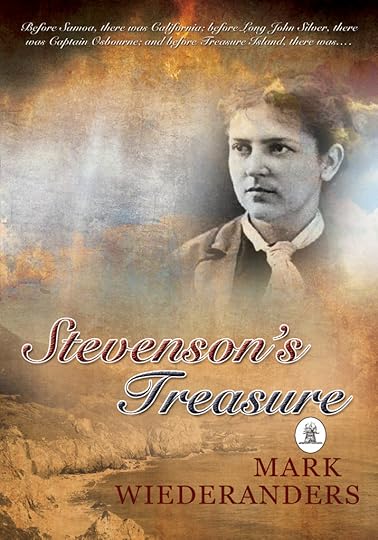 STEVENSON’S TREASURE is a fictional but carefully researched story about the year Robert Louis Stevenson leaves all that is safe in Scotland and journeys to California on what has to be one of the most romantic, ill-advised but successful quests a literary figure has ever made. Unknown and in shaky health, the 29-year-old writer in the summer of 1879 crosses the Atlantic by steamer and the American continent by rail. His objective is scandalous: to make an American art student he met in France, Fanny Osbourne, his wife despite the facts that she is already married (unhappily), has children and is ten years older than him. Showing up on her Monterey doorstep half-dead from several ailments, “Louis” nonetheless proposes marriage. Although her heart longs to say “yes,” she turns him down for a variety of practical reasons. Louis finds cheap lodgings nearby and vows to stay as long as it takes to overcome her objections. In their year-long struggle to somehow have a future together, Louis and Fanny must contend not just with his abysmal health but his inability to sell his writing, her handsome but philandering husband, a contentious teenage daughter and a skeptical ten-year-old son. From this mixture, stirred on a palette of landscapes that include France, Monterey, San Francisco, Calistoga and the Highlands of Scotland comes a more complete triumph than Stevenson had hoped for…
STEVENSON’S TREASURE is a fictional but carefully researched story about the year Robert Louis Stevenson leaves all that is safe in Scotland and journeys to California on what has to be one of the most romantic, ill-advised but successful quests a literary figure has ever made. Unknown and in shaky health, the 29-year-old writer in the summer of 1879 crosses the Atlantic by steamer and the American continent by rail. His objective is scandalous: to make an American art student he met in France, Fanny Osbourne, his wife despite the facts that she is already married (unhappily), has children and is ten years older than him. Showing up on her Monterey doorstep half-dead from several ailments, “Louis” nonetheless proposes marriage. Although her heart longs to say “yes,” she turns him down for a variety of practical reasons. Louis finds cheap lodgings nearby and vows to stay as long as it takes to overcome her objections. In their year-long struggle to somehow have a future together, Louis and Fanny must contend not just with his abysmal health but his inability to sell his writing, her handsome but philandering husband, a contentious teenage daughter and a skeptical ten-year-old son. From this mixture, stirred on a palette of landscapes that include France, Monterey, San Francisco, Calistoga and the Highlands of Scotland comes a more complete triumph than Stevenson had hoped for…Publication Date: February 23, 2014 | Fireship Press | Formats: eBook, Paperback
Genre: Historical Fiction

READ AN EXCERPT.Buy the Book
Barnes & NobleAbout the Author
 Mark Wiederanders lives in Northern California and writes about the private lives of famous authors. His screenplay about William Shakespeare's family, "Taming Judith" was a finalist in the Academy of Motion Pictures' annual screenwriting competition and was optioned by a film company. The idea for his current novel, STEVENSON'S TREASURE hatched during a visit to Carmel, when Mark learned that Robert Louis Stevenson suffered a near-fatal collapse in 1879 while hiking nearby. What was the young, as-yet unknown Scottish writer doing so far from home?
Mark Wiederanders lives in Northern California and writes about the private lives of famous authors. His screenplay about William Shakespeare's family, "Taming Judith" was a finalist in the Academy of Motion Pictures' annual screenwriting competition and was optioned by a film company. The idea for his current novel, STEVENSON'S TREASURE hatched during a visit to Carmel, when Mark learned that Robert Louis Stevenson suffered a near-fatal collapse in 1879 while hiking nearby. What was the young, as-yet unknown Scottish writer doing so far from home?To write the novel that resulted from this question, Mark studied hundreds of historical letters and visited sites near him in Monterey, San Francisco, and Calistoga. Then he followed Stevenson's footsteps to Europe, lodging at the Stevenson home in Edinburgh followed by a week in the Highlands cottage where RLS wrote TREASURE ISLAND. Mark is also a research psychologist (Ph.D, University of Colorado) who has studied treatment programs for delinquents and the criminally insane. His interests include acting in community theater (recently a Neil Simon play), downhill skiing, golf, and spending time with his wife and three grown children.
For more information please visit Mark Wiederander's website and blog. You can also find him on Facebook.
Stevenson's Treasure Blog Tour ScheduleMonday, September 15
Review & Interview at Back Porchervations
Tuesday, September 16
Review at The Writing Desk
Wednesday, September 17
Review at The Book Binder's Daughter
Review, Interview & Giveaway at Based on a True Story
Thursday, September 18
Review at Library Educated
Friday, September 19
Spotlight at CelticLady's Reviews
Monday, September 22
Spotlight & Giveaway at Passages to the Past
Tuesday, September 23
Interview at Book Babe
Wednesday, September 24
Spotlight at Princess of Eboli
Thursday, September 25
Review & Giveaway at Beth's Book Reviews
Spotlight & Giveaway at Let Them Read Books
Friday, September 26
Spotlight & Giveaway at Historical Fiction Connection
Wednesday, October 1
Review at Svetlana's Reads and Views
Published on September 23, 2014 00:00
September 22, 2014
Temperance's Trial by Hallee Bridgeman, the Story of a Wireless Operator in Occupied France
 I came across this series quite by accident while browsing Amazon one day. I preordered the first of them. It's a series about 7 different women, from different backgrounds, ethnicities, etc, with different skills that served during WWII. Each one of the stories is inspired by a real woman.
I came across this series quite by accident while browsing Amazon one day. I preordered the first of them. It's a series about 7 different women, from different backgrounds, ethnicities, etc, with different skills that served during WWII. Each one of the stories is inspired by a real woman.This one, about a wireless operator behind enemy lines, is based on Eileen Mary "Didi" Nearne, who like the heroine of this book, served in Occupied France. Also like the heroine, she and her brother (and a sister, not in the book) escaped France immediately upon German occupation and made their way to England where they all entered service with the SOE.
The real Eileen, according to the author notes, was one of only 39 women to parachute into Occupied France and she transmitted 105 messages during her operation.
I wondered while reading this story why the heroine does something so stupid--takes the wireless back to her room instead of doing her transmitting from the tomb and leaving the device with the code book--and it turns out the real Eileen actually did this and was arrested too
The author def stayed very true to original events. We follow Temperance as she escapes France, head back in the dark of night on a plane (flown by a woman pilot!), her wireless rig in tow, and pretends to be a seamstress while secretly sending data back to England and thus, aiding the Resistance. Meanwhile, an SS agent attempts to court her...and things just end up going so wrong.
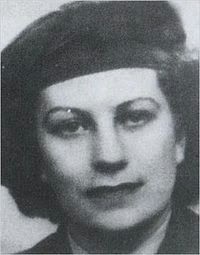 The real Eileen, from WikiAnd here is where I get upset....the story--and I knew this was a novella--ends at 75% with us having no idea what becomes of Temperance. I expected (since I can't acquire book two yet and have no idea when I can) that each woman's story would end before the next woman's story began, that they would satisfactorily concluded, but that wasn't the case.
The real Eileen, from WikiAnd here is where I get upset....the story--and I knew this was a novella--ends at 75% with us having no idea what becomes of Temperance. I expected (since I can't acquire book two yet and have no idea when I can) that each woman's story would end before the next woman's story began, that they would satisfactorily concluded, but that wasn't the case.I'm just going to tell myself that like the real Eileen, Temperance goes camp to camp, escapes, is picked up by the Americans, and later released.
I appreciate learning about this woman, especially appreciate the author notes, but I do not appreciate being left hanging. I also feel it was a tad too short, the story is only 3/4 of the book. Yes, this must make way for the author notes, but having spent almost three on kindle for it, I was expecting more.
I bought this on Amazon.
A side note to the author/editor/publisher: There is an entire repeated scene beginning with the odd words, THE twin at skirt and shifted her suitcase... and then going a few pages until the repeated scene ends.

Published on September 22, 2014 00:00
September 21, 2014
From Housewife to Helicopter Pilot: The Concetta Hassan Story
 "I guess what they say is true. If you let the bird out of the cage, it may not be happy stuck inside four walls."
"I guess what they say is true. If you let the bird out of the cage, it may not be happy stuck inside four walls."I loved this movie. It's so inspiring! It brings home that saying, "It's never too late" and you're never too old. And us women can certainly carry the load and take care of business.
Long story short: It's the late seventies and Concetta (this movie is based on a true story) is happily married with three children (one a baby. In real life the baby had a heart condition. In the movie, she doesn't.) When her husband has a heart attack and can't work anymore, they lose everything, and it's up to Concetta--despite her husband's protests and the damage to his pride--to get some money coming in...STAT.
After a failed gas station job, she joins the Army...at 32 years of age!
For a while there, I didn't think she was going to survive Basic, not under that bad-ass "John Wayne". (FYI, I loved this "John Wayne" lady. Watch the movie and check her out for yourself.)
She not only makes it, surprising everyone but her husband who knew she could do it all along, she strives for even more and four years later, decides to be a helicopter pilot, enrolling in flight school in which she's the only woman in a barracks full of men. And sometimes she's patronized...etc.
But we also see how her home life is, how the daughters have strife with their father, as he's the one home all day, and yet he's the one they turn to when they have a bad dream or whatever. And this hurts the working mother. It was also interesting to watch what it's like for a stay-at-home husband as he goes from shame to hurt pride to acceptance and telling people off for judging him. From anger at his wife to being proud of her.
Truly a great movie with so much to it. I wish they'd explained the man's heart condition better though. I mean, why couldn't he get a desk job at least? Seems to me being home with screaming girls all day is more stressful than sitting at a desk or selling insurance. And if he could have relations, why couldn't he climb a ladder? But I'm not a doctor...and don't understand. I also think the movie could have showed us just what kind of discrimination she faced besides a patronizing teacher. I know there had to be some. She mentions it in the newspaper articles.
Fabulous movie, terrific heroine. Remember, ladies, no matter how old you are, no matter how long you've been at home if that's the case, it's never too late to prove anything to yourself. It's always your TIME TO TRIUMPH.
The real Concetta flew helicopters in the Army way into her sixties. She was a flying grandma.
I watched this via Amazon Prime.

Published on September 21, 2014 00:00
September 20, 2014
The Reading Radar 9/20/2014
[image error]
Spotted on Amazon..Moon Queen by Katharine Branning. It's on my wishlist though I would like to find more information about it and the woman it's about. Never heard of her before, but then I know nothing really about Turkish history. Looks promising.
Mahperi the Moon Queen survived in a competitive court ruled by both love and hate in an era of builders and destroyers. Armed with intelligence and determination, she courageously weathered power struggles with male and female rivals, wars with the Mongols, intrigue at the court, and ultimate betrayal to become one of the most influential figures in the empire.
Inspired by true events and people, Moon Queen weaves a bright carpet of inspiration, by turns inspiring and heartbreaking, providing a new perspective on one of the most glorious periods of Turkish history.
***
 Spotted on Historical Editorial and I'm so in love with that cover, of course I have to read it... It's on my wishlist. The War Nurse by R.V. Doon.
Spotted on Historical Editorial and I'm so in love with that cover, of course I have to read it... It's on my wishlist. The War Nurse by R.V. Doon.
A historical family saga and epic romance set during World War II.
The War Nurse is a heart-rending story of two Americans, Katarina Stahl, a civilian nurse, and Jack Gallagher, a surgeon, caught in the Philippines on a goodwill medical mission, when war interrupts their newfound love. As the situation becomes dire, Katarina in an impulsive move frees a German doctor accused of spying; a haunting mistake, that sets off a chain of tragic events for her German-born parents in New York.
Now, pregnant with Jack’s child, Katarina begins a journey into depraved darkness as Manila descends into occupation and chaos. The horrific choices she has to make to avoid internment and starvation distances her from Jack. Three years of hell pass, and she has earned her nickname, war nurse, but can she regain the love of her life?
***
Found whilst browsing Amazon's upcoming historical fiction releases...it's a woman pilot! So of course it makes the wishlist: Return to Apathy by Eric Scott Johnston.
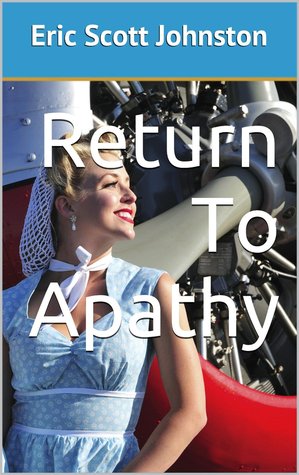 Africa, WWII...
Africa, WWII...
Annette cannot be tied-down. A free-spirited air courier for the Red Cross, Annette enjoys a carefree life until she begins a brief love affair with an army surgeon, Don Barnes. Their time together is cut short when Don receives orders to accompany seven soldiers on a mission to root out insurgents in the former Italian-occupied city of Asmara. He is never seen again.
Devastated, Annette spends the rest of the war looking for information on his whereabouts. Then, when she finds a small clue, she takes her aircraft into the Eritrean desert in hopes of finding him.
Amare is like any other 12-year-old boy living in Eritrea. Every week he makes the trek from his village to the capital, Asmara, to sweep the floors and oil the wood-working machines for Colonel Panelli, the commander of Italian forces in Asmara. Amare's modest salary affords him the latest issue of his favorite comic every month. But change is coming. As the Italian forces are threatened in Eritrea by the British advance, everyone is a potential soldier, even children. And, on the lonely road to his village, Amare is taken and forced to fight against the British as an insurgent for the infamous, Ascari. After living as a child-soldier for two years, Amare's life changes yet again when he encounters an American woman searching for her lover.
70-Years later…
After losing his daughter in a custody battle with his ex-wife, Michael concedes that abandoning his life to look for his father was meaningless. His new job as an investigator for JPAC quickly takes his mind off his current troubles as he is assigned to a case with a man who served under his Father in Vietnam, Frank Hayes. The job is to find seven missing WWII-era soldiers in Eritrea, Africa. Frank introduces him to an elderly woman living in Georgia named, Annette. Michael learns the key to finding the missing soldiers is Annette, but she will only help, if Michael agrees to learn about what she did after she left to search the desert 70-years ago, a place called, Apathy.
Told in Eric Scott Johnston's signature non-linear style, Return to Apathy spans decades and brings the reader across continents, love, loss and the inevitable path life take us on when a simple act of compassion changes the meaning of life. Return to Apathy is the follow-up to The Glass Girls and brings back Michael Huntington and other characters from the book that started it all.
***
 Spotted on NG and on my wishlist: Vigilante by Shelley Harris.
Spotted on NG and on my wishlist: Vigilante by Shelley Harris.
Jenny Pepper never expected to end up like this. Tired of her job and her lacklustre marriage, increasingly marginal in her teenage daughter's life, Jenny stumbles into a vigilante rescue one night; suddenly her world is exciting again - and she's a hero. In secret - in costume - she walks the streets of her small town, seeking to right wrongs. But secret identities are tricky to maintain, and Jenny's need for adventure is beginning to cost her dearly.
Then, amidst the petty crime, a terrifying villain appears. He's attacking young girls - and Jenny's daughter is at risk. As she starts to see less and less clearly through the mask, Jenny finds her fantasy life becoming frighteningly real.
We all want to be extraordinary, and we all have a moment in our lives when we realise that we're not. VIGILANTE is about a woman who didn't accept it gracefully.
***
A GR find: Her Own Vietnam by Lynn Kanter.
 For thirty years, Della Brown has tried to forget her service as a U.S. Army nurse treating horrific battlefield injuries in Vietnam. But now an unexpected message arrives that propels her into harrowing memories of the past. She must also confront the fissures in her family life, the mystery of her father’s disappearance, the things mothers and daughters cannot—maybe should not—know about one another, and the lifelong repercussions of a single mistake. An unflinching depiction of war and its personal costs, Her Own Vietnam is also a portrait of a woman in midlife—a mother, a nurse, and long ago a soldier.
For thirty years, Della Brown has tried to forget her service as a U.S. Army nurse treating horrific battlefield injuries in Vietnam. But now an unexpected message arrives that propels her into harrowing memories of the past. She must also confront the fissures in her family life, the mystery of her father’s disappearance, the things mothers and daughters cannot—maybe should not—know about one another, and the lifelong repercussions of a single mistake. An unflinching depiction of war and its personal costs, Her Own Vietnam is also a portrait of a woman in midlife—a mother, a nurse, and long ago a soldier.
Mahperi the Moon Queen survived in a competitive court ruled by both love and hate in an era of builders and destroyers. Armed with intelligence and determination, she courageously weathered power struggles with male and female rivals, wars with the Mongols, intrigue at the court, and ultimate betrayal to become one of the most influential figures in the empire.
Inspired by true events and people, Moon Queen weaves a bright carpet of inspiration, by turns inspiring and heartbreaking, providing a new perspective on one of the most glorious periods of Turkish history.
***
 Spotted on Historical Editorial and I'm so in love with that cover, of course I have to read it... It's on my wishlist. The War Nurse by R.V. Doon.
Spotted on Historical Editorial and I'm so in love with that cover, of course I have to read it... It's on my wishlist. The War Nurse by R.V. Doon.A historical family saga and epic romance set during World War II.
The War Nurse is a heart-rending story of two Americans, Katarina Stahl, a civilian nurse, and Jack Gallagher, a surgeon, caught in the Philippines on a goodwill medical mission, when war interrupts their newfound love. As the situation becomes dire, Katarina in an impulsive move frees a German doctor accused of spying; a haunting mistake, that sets off a chain of tragic events for her German-born parents in New York.
Now, pregnant with Jack’s child, Katarina begins a journey into depraved darkness as Manila descends into occupation and chaos. The horrific choices she has to make to avoid internment and starvation distances her from Jack. Three years of hell pass, and she has earned her nickname, war nurse, but can she regain the love of her life?
***
Found whilst browsing Amazon's upcoming historical fiction releases...it's a woman pilot! So of course it makes the wishlist: Return to Apathy by Eric Scott Johnston.
 Africa, WWII...
Africa, WWII...Annette cannot be tied-down. A free-spirited air courier for the Red Cross, Annette enjoys a carefree life until she begins a brief love affair with an army surgeon, Don Barnes. Their time together is cut short when Don receives orders to accompany seven soldiers on a mission to root out insurgents in the former Italian-occupied city of Asmara. He is never seen again.
Devastated, Annette spends the rest of the war looking for information on his whereabouts. Then, when she finds a small clue, she takes her aircraft into the Eritrean desert in hopes of finding him.
Amare is like any other 12-year-old boy living in Eritrea. Every week he makes the trek from his village to the capital, Asmara, to sweep the floors and oil the wood-working machines for Colonel Panelli, the commander of Italian forces in Asmara. Amare's modest salary affords him the latest issue of his favorite comic every month. But change is coming. As the Italian forces are threatened in Eritrea by the British advance, everyone is a potential soldier, even children. And, on the lonely road to his village, Amare is taken and forced to fight against the British as an insurgent for the infamous, Ascari. After living as a child-soldier for two years, Amare's life changes yet again when he encounters an American woman searching for her lover.
70-Years later…
After losing his daughter in a custody battle with his ex-wife, Michael concedes that abandoning his life to look for his father was meaningless. His new job as an investigator for JPAC quickly takes his mind off his current troubles as he is assigned to a case with a man who served under his Father in Vietnam, Frank Hayes. The job is to find seven missing WWII-era soldiers in Eritrea, Africa. Frank introduces him to an elderly woman living in Georgia named, Annette. Michael learns the key to finding the missing soldiers is Annette, but she will only help, if Michael agrees to learn about what she did after she left to search the desert 70-years ago, a place called, Apathy.
Told in Eric Scott Johnston's signature non-linear style, Return to Apathy spans decades and brings the reader across continents, love, loss and the inevitable path life take us on when a simple act of compassion changes the meaning of life. Return to Apathy is the follow-up to The Glass Girls and brings back Michael Huntington and other characters from the book that started it all.
***
 Spotted on NG and on my wishlist: Vigilante by Shelley Harris.
Spotted on NG and on my wishlist: Vigilante by Shelley Harris.Jenny Pepper never expected to end up like this. Tired of her job and her lacklustre marriage, increasingly marginal in her teenage daughter's life, Jenny stumbles into a vigilante rescue one night; suddenly her world is exciting again - and she's a hero. In secret - in costume - she walks the streets of her small town, seeking to right wrongs. But secret identities are tricky to maintain, and Jenny's need for adventure is beginning to cost her dearly.
Then, amidst the petty crime, a terrifying villain appears. He's attacking young girls - and Jenny's daughter is at risk. As she starts to see less and less clearly through the mask, Jenny finds her fantasy life becoming frighteningly real.
We all want to be extraordinary, and we all have a moment in our lives when we realise that we're not. VIGILANTE is about a woman who didn't accept it gracefully.
***
A GR find: Her Own Vietnam by Lynn Kanter.
 For thirty years, Della Brown has tried to forget her service as a U.S. Army nurse treating horrific battlefield injuries in Vietnam. But now an unexpected message arrives that propels her into harrowing memories of the past. She must also confront the fissures in her family life, the mystery of her father’s disappearance, the things mothers and daughters cannot—maybe should not—know about one another, and the lifelong repercussions of a single mistake. An unflinching depiction of war and its personal costs, Her Own Vietnam is also a portrait of a woman in midlife—a mother, a nurse, and long ago a soldier.
For thirty years, Della Brown has tried to forget her service as a U.S. Army nurse treating horrific battlefield injuries in Vietnam. But now an unexpected message arrives that propels her into harrowing memories of the past. She must also confront the fissures in her family life, the mystery of her father’s disappearance, the things mothers and daughters cannot—maybe should not—know about one another, and the lifelong repercussions of a single mistake. An unflinching depiction of war and its personal costs, Her Own Vietnam is also a portrait of a woman in midlife—a mother, a nurse, and long ago a soldier.
Published on September 20, 2014 00:00
September 19, 2014
An American Duchess Transforms from Fun, Feisty Aviatrix to Emotional Basket Case
 "I never believed in the idea of nobility. Now I understand what being noble truly means. It has nothing to do with a title. It's not even about sacrifice or duty. It's about a passion for your world, one that runs through your blood. It's about loving something so deeply you would never put yourself first."
"I never believed in the idea of nobility. Now I understand what being noble truly means. It has nothing to do with a title. It's not even about sacrifice or duty. It's about a passion for your world, one that runs through your blood. It's about loving something so deeply you would never put yourself first."In the past, I've often complained about romance novels, about how they always end with a couple getting married and the woman with a babe in her womb. So predictable. And is that really a HEA? We all know there's so much more to a woman's life, to marriage.
This story goes that further step, and for that I'll give it a few points, but now I understand why most stories end with marriage. It gets so boring after that. Though it didn't have to be...
I loved the first part of this book, loved the heroine, the scandal surrounding her arrival and the family she is marrying into. I laughed at her shocking remarks to all the uptight women, applauded her stance on women's rights, wanted more of her flying escapades. This was truly a heroine after my own heart....oh--and I grinned when she criticized the English upper class for having inherited their fortune rather than working for it. However, that last bit being said, I was surprised at how she changes after she's wed. It's not like she works for anything either, never did, come to think of it.
After she's married all she does is think about sex, how to get her husband to visit her bed more often, why her husband isn't sleeping with her. That becomes the main focus of her life, of her very existence. And then something bad happens and the story just won't let up on it and the emotional ramifications. I realize it's hard to go through in real life, but to pound on and on and on about it. The experience became too much of the story. The heroine became a ninny.
And then suddenly she declares, "I intend to be the first female to circumnavigate the globe. I can do this. you need three things: guts, ability and money. I do that those things, Nigel (her husband). And I want to the world that I do."
And, oh....my poor heart. I got excited for nothing. NOTHING. Oh , there's a brief mention--one sentence--of her flying from FL to NY, but that's all. Instead the story chooses to focus on her just doing something randomly stupid. And then suddenly she's afraid to fly over water, this girl was going to fly over the Atlantic? Huh? So while I loved her in the beginning, in the end I decided she was all bark, no bite.
The first part of the story has so much more going on: a younger sister in love with no dowry, a dowager stuck in the old ways, the question of a brother's sexuality, an uncle who has reason to throw the heroine's mother in jail...so much suspense and excitement that all disappears once the heroine marries and her focuses in life completely change.
At the risk of repeating myself, it was a great story in the beginning, but the exciting stuff was over too quickly and the not-so-exciting stuff expounded upon mercilessly: her loss, the duke's old-fashioned values, his shell shock. I am fully aware shell shock is an important issue, but this isn't The Poppy Factory and it was just too heavy and too much for this type of tale/genre.
I also got tired of the back and forth...I love him. I love him not. He loves me. He loves me not. I love him...
I received an ARC of this via Netgalley.

Published on September 19, 2014 00:00
September 18, 2014
Thieving Forest: The Unpredictable Futures of a 19th Century American Family
Susanna Quiner hid while she watched four of her sisters being violently torn from their home by a party of Potawatami warriors. Is this the opening scene of a propaganda piece designed to show us how savage the original inhabitants of North America were? Thieving Forest by Martha Conway may seem that way initially, but this story line is more complex than readers might think. I received a free copy of this novel from the author in return for an honest review.
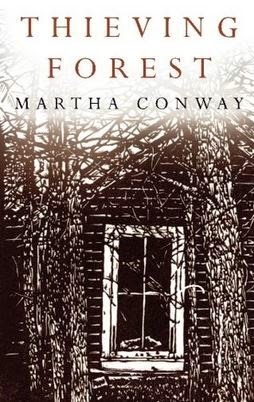
The tale takes place in early 19th century America. Its portrayal of the period is neither utopian nor dystopian. Martha Conway goes for realism. There are both horrific events and wonderful ones. The capture of these sisters isn’t what it appears to be. Each of the Quiner sisters has her own individual destiny. Susanna is determined to restore her family to the situation that had existed before they were captured, but neither her sisters nor their home were ever going to be the same. This is a lesson that Susanna learns over the course of the novel.
I do have to say that while Susanna is a sympathetic viewpoint character, she isn’t the sister who interested me most. From the beginning, I was drawn to Naomi the musician. Her story also turned out to be the one that I most wanted to follow. I would like to find out more of what happened to Naomi after the events of this book.
I learned more about a group of settlers about whom I had previously known very little. The Moravian missionaries who were originally from Germany established a settlement in Pennsylvania that was called the Gemeinschaft in this book. They and their Native American converts to Christianity seemed to live together in equality and harmony. Yet when Susanna looked beneath the surface, the Gemeinschaft didn’t seem so perfect. Perhaps one of the lessons of Thieving Forest is that there are no options that are perfect for everyone. Their community’s social structure reminded me a bit of the Shakers. I wanted to know more, so I ran a few searches on the Moravian Church. I learned that although they call their community a Gemeinschaft now, there is no record of their having done so in the early 19th century.
Just as Susanna's desire to re-create an ideal past was fated to be disappointed, readers who expect an ideal novel will never find one. Even if the author had chosen to follow Naomi rather than Susanna as I would have preferred, I probably would still have found flaws in Thieving Forest. Perhaps I would have become less enamored of Naomi if I had seen more of her. She might have made some foolish decisions as Susanna occasionally did in the course of the narrative. Yet Susanna always redeemed herself. Although there could have been many alternate paths that Thieving Forest might have traveled, the book we have is very readable and periodically enlightening.

Published on September 18, 2014 00:00
The Thieving Forest: The Unpredictable Futures of a 19th Century American Family
Susanna Quiner hid while she watched four of her sisters being violently torn from their home by a party of Potawatami warriors. Is this the opening scene of a propaganda piece designed to show us how savage the original inhabitants of North America were? The Thieving Forest by Martha Conway may seem that way initially, but this story line is more complex than readers might think. I received a free copy of this novel from the author in return for an honest review.

The tale takes place in early 19th century America. Its portrayal of the period is neither utopian nor dystopian. Martha Conway goes for realism. There are both horrific events and wonderful ones. The capture of these sisters isn’t what it appears to be. Each of the Quiner sisters has her own individual destiny. Susanna is determined to restore her family to the situation that had existed before they were captured, but neither her sisters nor their home were ever going to be the same. This is a lesson that Susanna learns over the course of the novel.
I do have to say that while Susanna is a sympathetic viewpoint character, she isn’t the sister who interested me most. From the beginning, I was drawn to Naomi the musician. Her story also turned out to be the one that I most wanted to follow. I would like to find out more of what happened to Naomi after the events of this book.
I learned more about a group of settlers about whom I had previously known very little. The Moravian missionaries who were originally from Germany established a settlement in Pennsylvania that was called the Gemeinschaft in this book. They and their Native American converts to Christianity seemed to live together in equality and harmony. Yet when Susanna looked beneath the surface, the Gemeinschaft didn’t seem so perfect. Perhaps one of the lessons of The Thieving Forest is that there are no options that are perfect for everyone. Their community’s social structure reminded me a bit of the Shakers. I wanted to know more, so I ran a few searches on the Moravian Church. I learned that although they call their community a Gemeinschaft now, there is no record of their having done so in the early 19th century.
Just as Susanna's desire to re-create an ideal past was fated to be disappointed, readers who expect an ideal novel will never find one. Even if the author had chosen to follow Naomi rather than Susanna as I would have preferred, I probably would still have found flaws in The Thieving Forest. Perhaps I would have become less enamored of Naomi if I had seen more of her. She might have made some foolish decisions as Susanna occasionally did in the course of the narrative. Yet Susanna always redeemed herself. Although there could have been many alternate paths that The Thieving Forest might have traveled, the book we have is very readable and periodically enlightening.

Published on September 18, 2014 00:00
September 17, 2014
Saving Amelie: A Novel About the T4 Program When Nazis Targeted the Disabled
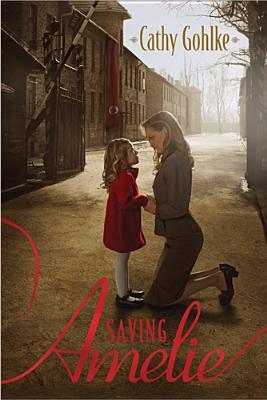
"They are going to rid Germany of every genetically imperfect man, woman, and child. Handicapped physically, mentally, emotionally--it doesn't matter. They will all be gone for the greater good of the Fatherland. That means Amelie."
I've heard of the Nazi T4 program before, in a small children's book in which a deaf girl placed in a concentration camp wrote poetry about her struggles.
What I did not know and this book showed me was the whole genetics research that led to the mass murders of the deaf, "slow", blind, etc.
I did not know that the Nazi scientists were sterilizing women without their consent or knowledge, declaring them unfit to breed. I did not know that they were gathering the deaf and blind and otherwise "unfit for German society" children into black vans with painted windows and then driving around while gassing the unsuspecting and frightened children in the back.
As a deaf woman, this frightens me, that this mentality and way of thinking ever existed, even for a moment. I don't consider myself a blight on society...but that's a rant for another day and time. It was hard for me to read about this disgust for people like me, but as I've said before, "If you forget history, you risk repeating it," and thus I appreciated learning about this.
It's what drew me to this story in the first place. However, there's a lot more going on in this book than the Tiergarten 4 program and the people who attempted to escape it (I loved those bits and found my heart beating rapidly many times as Amelie, Rachel, and Lea tried to leave town or something and here comes the SS...) and it's the other plotlines I didn't care for and caused me to skim at times.
I didn't care for the sibling rivalry between Lea and Rachel. It was childish and out of place given the situation they were facing. I didn't like Lea. In the author's defense, I very recently read a novel called The Winter Guest that had enough sibling rivalry to last me ten years. I disliked that book so much that as soon as Lea looked at Rachel in a hateful, jealous way, my hackles rose.
I couldn't care less about the Passion Play. Or the children in it.
There were too many people and POVs. Some could have been eliminated--perhaps not their existence but their story bits. Like Frederick or even the Jewish girl and her tale. It's as if too many stories were being crammed into one. Amelie, Rache's friend, the Nazi's obsession for Rachel, genetics, the reporter, religion in Germany, Lea, Fred, even biblical Jacob, Lea, and Rachel.....
And in all this there was so little of Amelie, I question the title of this story. She's four years old, she's deaf, she needs to escape, her father wanted her dead...but the story is not about her. I also don't care for how she portrayed. We're told she's intelligent, that she signs, wants to communicate, etc, but yet they feed her like a baby. Has she been through a rough time? Yes... but seriously? She can go potty and pick up a spoon and feed herself. Deaf doesn't mean incapable of the most basic functioning. And that little skit based on her. Why does a four-year-old need to seek forgiveness?
The whole thing about faith didn't bother me. I was expecting it. Though I must say it was all crammed into the last half.
I received this via Netgalley.

Published on September 17, 2014 00:00
September 16, 2014
Sometimes What We Want Isn't What Makes Us Happy...Go Away Home by Carol Bodensteiner
 I devoured this novel in a day. I just liked it that much and was so interested in what happened. The story follows Liddie, a young girl on a farm who wants so much more, to go the big city and become a seamstress/dress maker. She wants to see the world.
I devoured this novel in a day. I just liked it that much and was so interested in what happened. The story follows Liddie, a young girl on a farm who wants so much more, to go the big city and become a seamstress/dress maker. She wants to see the world.There's no huge mystery; it's not all about romance either. Really, it's just everyday life in Iowa, from the POV of a farm girl with dreams. But is what she thinks she wants what's going to make her happy?
As she grew up in the story, it became so obvious to me, the changes that were occurring not only in the world around her, but inside her. We are never the same person we were ten years ago.
There are beaus. Proposals. Career changes. Deaths in the family. Choices to make. Snotty people about town. Kind-hearted folks who lend a hand when needed. Family drama and love. And as she lives her life, we hear about what's going on in the world too: Wilson not granting women the vote, the stirrings of WWI, the women not wanting to send their sons, the draft, the tension over Germans, the orphan trains, the Spanish flue.
Also, the trials of juggling one's desires and one's spouse's desires too and how sometimes we may have to set aside our dreams for a while but not abandon them completely. There's a time for everything. That was somewhat a moral, I guess. At least that's what the story made me think about and I like a book that makes me think. It also touches on the give and take in a marriage.
And so much fascinating stuff about photography during this period.
I have nothing bad to say about this story. I really enjoyed the writing, the characters, the lessons within its pages, and the peeks at interesting things that occurred in American Midwest history. I'll be watching for another novel from this author.
I borrowed this on Amazon Prime.

Published on September 16, 2014 00:00



